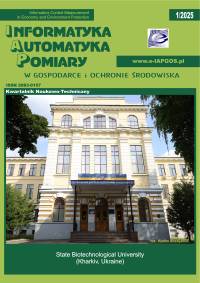ITERATIVE DECODING OF SHORT LOW-DENSITY PARITY-CHECK CODES BASED ON DIFFERENTIAL EVOLUTION
Mykola Shtompel
shtompel.mykola@kart.edu.uaUkrainian State University of Railway Transport, Department of Transport Communication (Ukraine)
https://orcid.org/0000-0003-3132-8335
Sergii Prykhodko
Ukrainian State University of Railway Transport, Department of Transport Communication (Ukraine)
https://orcid.org/0000-0001-6535-8351
Abstract
To ensure a given quality of service in the networks of the Internet of Things, short error-correcting codes are used, in particular, low-density parity-check codes. The paper proposes an approach for decoding these codes based on the joint application of belief propagation and differential evolution procedures. It is shown that in order to reduce the search area of error vectors based on differential evolution, it is necessary to use the least reliable basis of the parity-check matrix. Flowchart and pseudocode of the combined decoding algorithm of short low-density parity-check codes were presented. The simulation results showed that the proposed decoding method provides an additional gain from encoding compared to the classical decoding method. The application of the presented iterative decoding method of short low-density parity-check codes will improve the efficiency of data transmission in the infrastructure of the Internet of Things.
Keywords:
Internet of Things, low-density parity-check codes, iterative decoding, differential evolutionReferences
Buchberger A. et al.: Learned decimation for neural belief propagation decoders: Invited paper. ICASSP 2021–2021 IEEE International Conference on Acoustics, Speech and Signal Processing (ICASSP), 2021, 8273–8277.
DOI: https://doi.org/10.1109/ICASSP39728.2021.9414407
Google Scholar
Chaibi H. et al.: Parallel genetic algorithm decoder scheme based on DP-LDPC codes for industrial IoT scenarios. Procedia Computer Science 176, 2020, 3496–3505.
DOI: https://doi.org/10.1016/j.procs.2020.09.047
Google Scholar
Chettri L., Bera R.: A comprehensive survey on internet of things (IoT) toward 5G wireless systems. IEEE Internet of Things Journal 7(1), 2019, 16–32.
DOI: https://doi.org/10.1109/JIOT.2019.2948888
Google Scholar
Jiang M. et al.: Partial CRC-aided decoding of 5G-NR short codes using reliability information. Science China Information Sciences 62, 80303, 2019.
DOI: https://doi.org/10.1007/s11432-019-9905-7
Google Scholar
Khan B. S. et al.: URLLC and eMBB in 5G industrial IoT: A survey. IEEE Open Journal of the Communications Society 3, 2022, 1134–1163.
DOI: https://doi.org/10.1109/OJCOMS.2022.3189013
Google Scholar
Liu T., Chen X.: Deep learning-based belief propagation algorithm over non-binary finite fields. International Conference on Wireless Communications and Signal Processing (WCSP), 2020, 164–169.
DOI: https://doi.org/10.1109/WCSP49889.2020.9299875
Google Scholar
Panchenko S. et al.: Analysis of efficiency of the bioinspired method for decoding algebraic convolutional codes. Eastern-European Journal of Enterprise Technologies 2-4(98), 2019, 22–30.
DOI: https://doi.org/10.15587/1729-4061.2019.160753
Google Scholar
Price K., Storn R. M., Lampinen J. A.: Differential evolution: A practical approach to global optimization. Springer 2005.
Google Scholar
Rosseel J. et al.: Error structure aware parallel BP-RNN decoders for short LDPC codes. 2021 11th International Symposium on Topics in Coding (ISTC), 2021, 1–5.
DOI: https://doi.org/10.1109/ISTC49272.2021.9594200
Google Scholar
Rosseel J. et al.: Decoding short LDPC codes via BP-RNN diversity and reliability-based post-processing. IEEE Transactions on Communications 70(12), 2022, 7830–7842.
DOI: https://doi.org/10.1109/TCOMM.2022.3218821
Google Scholar
Watanabe K. et al.: Shortened LDPC codes accelerate OSD decoding performance. EURASIP Journal on Wireless Communications and Networking 22, 2021.
DOI: https://doi.org/10.1186/s13638-021-01901-x
Google Scholar
Authors
Mykola Shtompelshtompel.mykola@kart.edu.ua
Ukrainian State University of Railway Transport, Department of Transport Communication Ukraine
https://orcid.org/0000-0003-3132-8335
Authors
Sergii PrykhodkoUkrainian State University of Railway Transport, Department of Transport Communication Ukraine
https://orcid.org/0000-0001-6535-8351
Statistics
Abstract views: 120PDF downloads: 63









